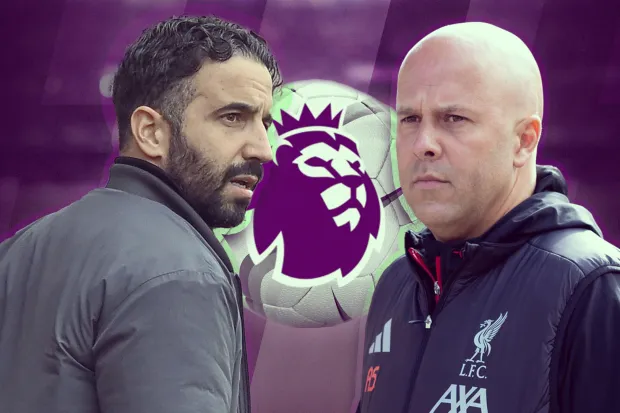The Premier League never sleeps, and neither does the drama. As the 2025/26 campaign heats up, four iconic clubs — Liverpool, Nottingham Forest, Wolves, and West Ham United find themselves engulfed in crisis. From tactical turmoil and ageing squads to boardroom instability and fan revolts, each club’s story reads like a cautionary tale of what happens when ambition meets chaos.
This week, Between the Lines dives deep into the numbers, narratives, and nuances behind their dramatic decline — and what could possibly come next for these fallen giants.
Liverpool’s Decline: Salah’s Struggles and a Shaky Defence
The unthinkable has happened at Anfield. Liverpool have now lost four consecutive games for the first time since 2014, with their latest defeat to Manchester United underscoring a worrying collapse in both form and confidence.
Just last season, Mohamed Salah was the heartbeat of Liverpool’s attack — contributing directly to more than 55% of their Premier League goals with 29 strikes and 18 assists. Fast forward to this campaign, and the Egyptian talisman looks a shadow of himself. At 33, Salah has gone seven league games without a non-penalty goal the longest drought of his Liverpool career.
Former Reds defender Jamie Carragher didn’t mince words: “He’s declined physically. He shouldn’t be an automatic starter anymore.”
The data backs him up. Salah’s shot volume and expected goals (xG) have plummeted, suggesting the issue isn’t poor finishing — it’s a lack of chances altogether. With Trent Alexander-Arnold sidelined, the devastating right-side chemistry that once terrorised defences has vanished. Replacement full-backs Conor Bradley and Jeremie Frimpong have yet to fill that creative void, while the left side is unsettled with Milos Kerkez often preferred over Andrew Robertson.
At the heart of defence, Virgil van Dijk and Ibrahima Konaté — once rock-solid — have taken turns underperforming. The result? Liverpool have conceded two or more goals in eight of their last 12 Premier League matches. For a team once defined by defensive dominance, the numbers tell a grim story.
Until Klopp’s men rediscover their defensive rhythm and Salah’s spark returns, Liverpool’s title hopes will remain a distant dream.
Nottingham Forest: Managerial Chaos and Identity Crisis
Over at the City Ground, Nottingham Forest’s season has descended into chaos. Once tipped for a top-four challenge, they now find themselves teetering in the relegation zone after a managerial merry-go-round that’s seen three different bosses in just a few months.
Greek owner Evangelos Marinakis sacked Ange Postecoglou after only 39 days in charge — following an ill-fated attempt to turn Forest into a possession-heavy, short-passing side. The players struggled with the drastic tactical shift, failing to win any of his eight games.
Now, Sean Dyche has been parachuted in to steady the ship, bringing back the old-school pragmatism and direct approach that mirrors the Nuno Espirito Santo era. However, Dyche’s pressing system and high defensive line are a far cry from the passive, counter-attacking style his predecessor preferred.
Forest’s dressing room, already stretched thin by tactical whiplash, faces yet another overhaul. With daunting fixtures ahead against Porto, Bournemouth, and Manchester United — Dyche will need to find stability fast.
For all of Marinakis’ ambition and investment, Forest’s revolving door of managers and shifting philosophies have left the club without a clear identity. The result: a talented squad paralysed by uncertainty.
Wolves: From Sales to Struggles
Few teams have endured as much upheaval as Wolverhampton Wanderers. Eight games into the season, Wolves remain winless and rooted to the bottom of the table — exactly as many predicted when the Sky Sports supercomputer tipped them for an 18th-place finish.
The summer exodus gutted the team. Key players Matheus Cunha, Rayan Aït-Nouri, Pedro Neto, Nelson Semedo, and Mario Lemina are all gone, stripping away more than 60% of Wolves’ goal involvements from the past two seasons.
Financially, the club turned a modest £20.9 million profit in the transfer window — but at a heavy cost on the pitch. Their replacements, including Fer López, Tolu Arokodare, and Jhon Arias, have combined for just one assist so far. Striker Jørgen Strand Larsen, once linked to Newcastle, is yet to find the net after making his loan deal permanent.
Head coach Vítor Pereira, despite signing a new three-year contract, now faces growing pressure from fans frustrated by Wolves’ blunt attack and predictable performances. With only five goals in eight games, the once-resilient Molineux outfit now looks like a team stripped of both belief and bite.
If things don’t turn quickly, Wolves’ long Premier League stay could be nearing its end.
West Ham United: Big Spending, Small Returns
Across London, West Ham United are battling demons of their own. Despite spending close to £600 million on transfers since moving to the London Stadium in 2016 — the sixth-highest net spend in the Premier League — the Hammers have failed to turn investment into consistent success.
New manager Nuno Espirito Santo, who replaced Graham Potter last month, faces the daunting task of reviving a squad low on confidence and connection with its supporters.
The move to the London Stadium, once hailed as a financial masterstroke, remains deeply unpopular among fans. Supporters’ groups have organised protests calling for greater transparency, citing poor recruitment and underachievement despite the club’s strong revenue streams.
Even their Europa Conference League triumph last season feels like a distant memory amid domestic mediocrity. Since 2016, West Ham have finished in the bottom half of the Premier League more often than the top half — a damning return for a club of their stature and resources.
Captain Jarrod Bowen’s visible frustration during recent games sums up the mood perfectly: a club stuck between ambition and mismanagement. Until the board rebuilds trust and the squad finds consistency, West Ham risk being defined not by progress — but by potential wasted.
The Bigger Picture
From Anfield to Molineux, one thing unites these four clubs: a crisis of identity.
Liverpool’s ageing stars, Forest’s tactical confusion, Wolves’ talent drain, and West Ham’s chronic underachievement reveal the same underlying truth — success in the Premier League demands not just money, but strategy, patience, and vision.
As the season unfolds, the question isn’t just who will survive — but who will learn. Because in today’s unforgiving Premier League, reputations mean nothing if results don’t follow.


